
The Distinguished Conduct Medal was a decoration established in 1854 by Queen Victoria for gallantry in the field by other ranks of the British Army. It is the oldest British award for gallantry and was a second level military decoration, ranking below the Victoria Cross, until it was discontinued in 1993 when it was replaced by the Conspicuous Gallantry Cross. The medal was also awarded to non-commissioned military personnel of other Commonwealth Dominions and Colonies.

The Good Conduct Medal is one of the oldest military awards of the United States Armed Forces. The U.S. Navy's variant of the Good Conduct Medal was established in 1869, the Marine Corps version in 1896, the Coast Guard version in 1923, the Army version in 1941, and the Air Force version in 1963; the Air Force Good Conduct Medal was temporarily discontinued from February 2006 to February 2009, followed by its subsequent reinstatement.
The Canadian Forces' Decoration is a Canadian award bestowed upon members of the Canadian Armed Forces who have completed twelve years of military service, with certain conditions. By convention, it is also given to the governor general of Canada upon his or her appointment, which includes the title of Commander-in-Chief in and over Canada. The decoration is awarded to all ranks, who must have a good record of conduct during the final eight years of claimed service.
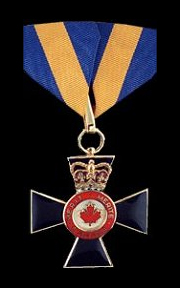
The Order of Merit of the Police Forces is an honour for merit that is, within the Canadian system of honours, the only such fellowship reserved for only members of Canada's various police forces. Created in 2000, the order is administered by the Governor in Council, on behalf of the Canadian monarch. Appointment to the order recognizes conspicuous merit and exceptional service, the level of which is reflected by the organization's three hierarchical grades.
The orders, decorations, and medals of Canada comprise a complex system by which Canadians are honoured by the country's sovereign for actions or deeds that benefit their community or the country at large. Modelled on its British predecessor, the structure originated in the 1930s, but began to come to full fruition at the time of Canada's centennial in 1967, with the establishment of the Order of Canada, and has since grown in both size and scope to include dynastic and national orders, state, civil, and military decorations; and various campaign medals. The monarch in right of each Canadian province also issues distinct orders and medals to honour residents for work performed in just their province. The provincial honours, as with some of their national counterparts, grant the use of post-nominal letters and or supporters and other devices to be used on personal coats of arms.
The orders, decorations, and medals of the Canadian provinces, in which each province of Canada has devised a system of orders and other awards to honour residents for actions or deeds that benefit their local community or province, are in turn subsumed within the Canadian honours system. Each province sets its own rules and criteria for eligibility and also for how each award is presented. Most of the awards allow for the recipients to wear their awards in public, and most grant the recipients the use of post-nominal letters after their names. Not all of the awards listed below are part of the Canadian honours system, thus some of them may not be worn or court mounted with awards that are part of the Canadian honours system.

There is an Honorary Police force in each of the twelve parishes of Jersey. Members of the Honorary Police are elected by the voters of the parish in which they serve, and are unpaid.
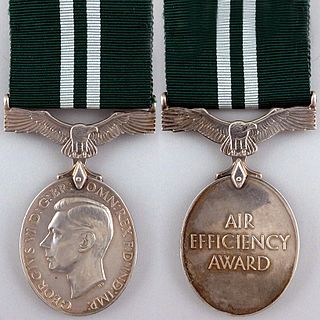
The Air Efficiency Award, post-nominal letters AE for officers, was instituted in 1942. It could be awarded after ten years of meritorious service to officers, airmen and airwomen in the Auxiliary and Volunteer Air Forces of the United Kingdom and the Territorial Air Forces and Air Force Reserves of the Dominions, the Indian Empire, Burma, the Colonies and Protectorates.
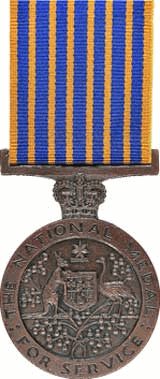
The National Medal is an Australian award given for long service by operational members of specified eligible organisations. It was introduced in 1975, as an original component of the new Australian honours system, and replaced a range of medals available to military and civilian uniformed services for long service and good conduct. The eligible groups have in common that their members serve or protect the community at the risk of death, injury or trauma, hence it is only available to members of the eligible organisations who are operationally deployed. In the case of corrective services, eligibility is restricted to officers with custodial duties.
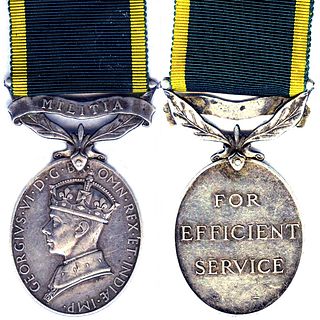
The Efficiency Medal was instituted in 1930 for award to part-time warrant officers, non-commissioned officers and men after twelve years of efficient service on the active list of the Militia or the Territorial Army of the United Kingdom, or of the other Auxiliary Military Forces throughout the British Empire. At the same time a clasp was instituted for award to holders of the medal upon completion of further periods of six years of efficient service.

The Order of Military Merit is a military honour for merit that is, within the Canadian system of honours, the second highest order administered by the governor in Council on behalf of the Canadian monarch.
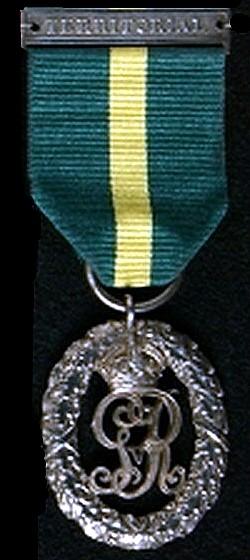
The Efficiency Decoration, post-nominal letters TD for recipients serving in the Territorial Army of the United Kingdom or ED for those serving in the Auxiliary Military Forces, was instituted in 1930 for award to part-time officers after twenty years of service as an efficient and thoroughly capable officer. The decoration superseded the Volunteer Officers' Decoration, the Colonial Auxiliary Forces Officers' Decoration and the Territorial Decoration.
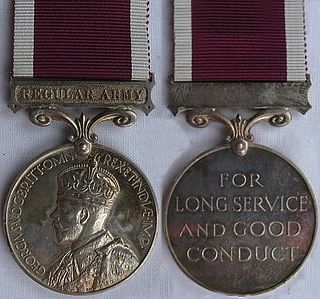
The Medal for Long Service and Good Conduct (Military) is a medal awarded to regular members of the armed forces. It was instituted by King George V in 1930 and replaced the Army Long Service and Good Conduct Medal as well as the Permanent Forces of the Empire Beyond the Seas Medal. The medal was originally awarded to Regular Army warrant officers, non-commissioned officers and men of the UK Armed Forces. It also had a number of territorial versions for the Permanent Forces of the British Dominions. The eligibility criteria were relaxed in 1947 to also allow the award of the medal to officers who had served a minimum period in the ranks before being commissioned. Since 2016, the eligibility was widened to include officers who had never served in the ranks, and so the medal can now be awarded to all regular members of the British Armed Forces who meet the required length of service.

The Efficiency Medal (South Africa) was instituted in 1930 for award to part-time warrant officers, non-commissioned officers and men after twelve years of efficient service on the active list of the Citizen Force of the Union of South Africa. At the same time, a clasp was instituted for award to holders of the medal upon completion of further periods of six years of efficient service. The medal superseded the Colonial Auxiliary Forces Long Service Medal.

The John Chard Medal is a military long service medal which was instituted by the Union of South Africa on 6 April 1952. Until 1986, it was awarded to members of the Citizen Force of the South African Defence Force for twelve years of efficient service and good conduct. The period of qualifying service was reduced to ten years in 1986.

The Police Long Service and Good Conduct Medal is a decoration for police officers of the United Kingdom. First instituted in 1951, the medal is presented for twenty aggregate years of service in the police services of the United Kingdom.
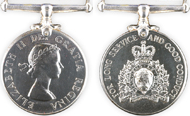
The Royal Canadian Mounted Police Long Service Medal was established by royal warrant on 6 March 1934 by King George V. It is the oldest continually awarded honour within the Canadian honours system, and the first created specifically for Canadian service within Canada. Initially proposed by the Royal North-West Mounted Police Veterans’ Association, it took more than ten years for the proposal to be realized. The determination of the veterans was aided by the interest of Commissioner Cortlandt Starnes and Prime Minister R.B. Bennett.

The Royal Naval Volunteer Reserve Long Service and Good Conduct Medal, initially designated the Royal Naval Volunteer Reserve Long Service Medal, was instituted in 1908. It could be awarded to part-time ratings in the United Kingdom's Royal Naval Volunteer Reserve after twelve years of service and good conduct. The medal was a Naval version of the Volunteer Long Service Medal and its successor, the Territorial Force Efficiency Medal.

The Naval Long Service and Good Conduct Medal (1848) is a long service medal awarded to regular members of His Majesty's Naval Service. It was instituted by Queen Victoria to replace the Naval Long Service and Good Conduct Medal (1830), and could be awarded to other ranks and men serving in the Royal Navy and Royal Marines. Since 2016, after a number of changes in eligibility, all regular members of the Royal Navy and Royal Marines who have completed fifteen years of reckonable service can be awarded the medal.

The Royal Air Force Long Service and Good Conduct Medal is a medal awarded to regular members of the Royal Air Force in recognition of long service. It was instituted by King George V in 1919, the year following the establishment of the world's first independent air force. At first, the medal was awarded to Regular Force non-commissioned officers and airmen of the Royal Air Force. The award criteria were later relaxed to also allow the award of the medal to officers who had served a minimum period in the ranks before being commissioned. Since 2016, it is awarded to all regular members of the RAF, including officers who had never served in the ranks.

















